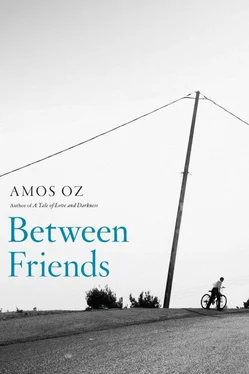ON OUR KIBBUTZ, Kibbutz Yekhat, there lived a man, Zvi Provizor, a short fifty-five-year-old bachelor who had a habit of blinking. He loved to transmit bad news: earthquakes, plane crashes, buildings collapsing on their occupants, fires, and floods. He read the papers and listened to all the news broadcasts early in the morning, so that he could catch us at the entrance to the dining hall and astound us with the story of two hundred and fifty coal miners hopelessly trapped somewhere in China or six hundred passengers drowned when a ferry capsized in a storm in the Caribbean. He also used to memorize obituaries. Always first to know which famous people had died, he would inform the entire kibbutz. One morning he stopped me on the path in front of the clinic.
“Ever hear of a writer named Wislavsky?”
“Yes. Why?”
“He died.”
“Sorry to hear it.”
“Writers die, too.”
And another time he caught me when I was working the dining-hall shift:
“I saw in the obituaries that your grandfather died.”
“Yes.”
“And three years ago, your other grandfather died.”
“Yes.”
“So this one was the last.”
Zvi Provizor was the kibbutz gardener. He would go out at five every morning, reposition the sprinklers, till the soil in the flower beds, plant and prune and water, mow lawns with the noisy mower, spray against aphids, and spread organic and chemical fertilizer. Attached to his belt was a small transistor radio that provided him with a constant infusion of disastrous news:
“Did you hear? A huge massacre in Angola.”
Or: “The Minister of Religious Affairs died. They just announced it ten minutes ago.”
The other kibbutz members avoided him. In the dining hall, they rarely joined him at his table. On summer evenings he would sit alone on the green bench at the foot of the large lawn in front of the dining hall and watch the children playing on the grass. The breeze billowed out his shirt, drying his sweat. A hot summer moon shone red as it rose above the tall cypress trees. One evening Zvi Provizor greeted a woman named Luna Blank who was sitting alone on an adjacent bench.
“Did you hear?” he said to her sadly. “In Spain an orphanage burned down and eighty orphans died of smoke inhalation.”
Luna, a forty-five-year-old widowed teacher, wiped the sweat from her brow with a handkerchief and said, “That’s horrible.”
“Only three survivors were rescued,” Zvi said, “and they’re in critical condition.”
We all respected his dedication to his work: never, in the twenty-two years that he’d lived on the kibbutz, had a single sick day been noted on his time sheet. Thanks to him, the kibbutz bloomed. Every unused strip of land was planted with seasonal flowers. Here and there he had put in rock gardens where he planted varieties of cactus. He had erected wooden trellises for grapevines. In front of the dining hall he installed a burbling fountain filled with goldfish and aquatic plants. He had a good aesthetic sense and everyone appreciated it.
But behind his back we called him the Angel of Death and gossiped about him: he didn’t have and had never had an interest in women, we would say. Or in men, for that matter. One young fellow, Roni Shindlin, did a marvelous imitation of Zvi that made us roar with laughter. In the afternoon, when the kibbutz members sat on their porches and drank coffee or played with their children on the small lawns in front of their houses, Zvi Provizor would go to the clubhouse to read the newspapers in the company of five or six solitary men like him, avid readers and debaters, aging bachelors, widowers, or divorcés.
From his corner, Reuvkeh Roth, a small bald man with large batlike ears, would mumble that retaliatory raids only escalated the violence because revenge begets revenge and retaliation begets retaliation.
The others would immediately attack him: “What are you talking about? We can’t let them get away with it!” “Restraint and appeasement only make the Arabs more brazen.”
Zvi Provizor would blink and say, “In the end, it’ll turn into a war. It can only cause a terrible war.”
And Emanuel Glozman, the stutterer, would say excitedly, “W-w-war. Very g-g-good. We’ll w-w-win and t-t-take their l-l-land all the w-w-way to the J-J-Jordan.”
Reuvkeh Roth would think out loud: “Ben Gurion is a great chess player. He always sees five moves ahead. Except that everything with him is always by force.”
On that subject, Zvi Provizor would prophesy gloomily, “If we lose, the Arabs will come and wipe us out. If we win, the Russians will come and blow us up.”
Emanuel Glozman would plead, “E-e-enough, friends, qu-qu-quiet. Let m-m-me read the p-p-papers in p-p-peace.”
And Zvi, after a few moments’ silence, would say, “Did you hear? It says here that the King of Norway has liver cancer. And the head of our regional council has cancer, too.”
Whenever Roni Shindlin, the comedian, saw Zvi at the shoemaker’s or by the clothing storeroom, he would ask him mockingly, “So, Angel of Death, what plane crashed today?”
Zvi Provizor and Luna Blank fell into a routine: they talked every evening. He would sit on the right-hand edge of the left bench at the foot of the lawn and she would sit near him, on the left-hand edge of the right bench. He would blink as he spoke to her and she, wearing a pretty sleeveless sundress, would crumple her handkerchief between her fingers. Praising the kibbutz gardens, the fruit of his labor, she said that thanks to him, they lived on a green meadow, in the shade of blossoming orchards, among blooming flower beds. She had a weakness for fancy words. A third-grade teacher, she made excellent, delicate pencil drawings that hung on the walls of our small apartments. Her face was round and smiling and her eyelashes long, though her neck was slightly wrinkled and she had thin legs and almost no breasts. Her husband had been killed several years earlier while doing reserve duty on the Gaza border and they’d had no children. The kibbutz members considered her an admirable figure, a woman who had overcome tragedy and poured her entire soul into teaching. Zvi talked to her about the different species of roses and she nodded eagerly, as if agreeing with every word. Then he gave her a detailed description of the horrors of the locust plague that was devastating Sudan.
Luna said, “You’re a very sensitive person.”
Zvi blinked quickly and said, “Sudan doesn’t have much greenery as it is.”
Luna said, “Why do you take all the sorrows of the world on your shoulders?”
And Zvi replied, “Closing your eyes to the cruelty of life is, in my opinion, both stupid and sinful. There’s very little we can do about it. So we have to at least acknowledge it.”
One summer evening she invited Zvi to her place for coffee. He came in his after-work clothes, long khaki trousers and a short-sleeved light-blue shirt. His radio was still attached to his belt, and at eight o’clock he excused himself and listened to the news headlines. Hanging on the walls of Luna Blank’s room were several of her pencil drawings in simple frames, sketches of dreamy young girls and landscapes, rocky hills and olive trees. Beneath the window was a double bed with embroidered Oriental pillows. The row of books on the white bookshelf was arranged by height, from tall art books of paintings by Van Gogh, Cézanne, and Gauguin, to shorter volumes of the Cassuto Bible, and, finally, a series of squat little novels published by Hasifria Le’Am. In the middle of the room was a round coffee table with two plain armchairs on either side. The table was covered with an embroidered tablecloth and set for two with coffee cups and plates for biscuits.
Читать дальше












